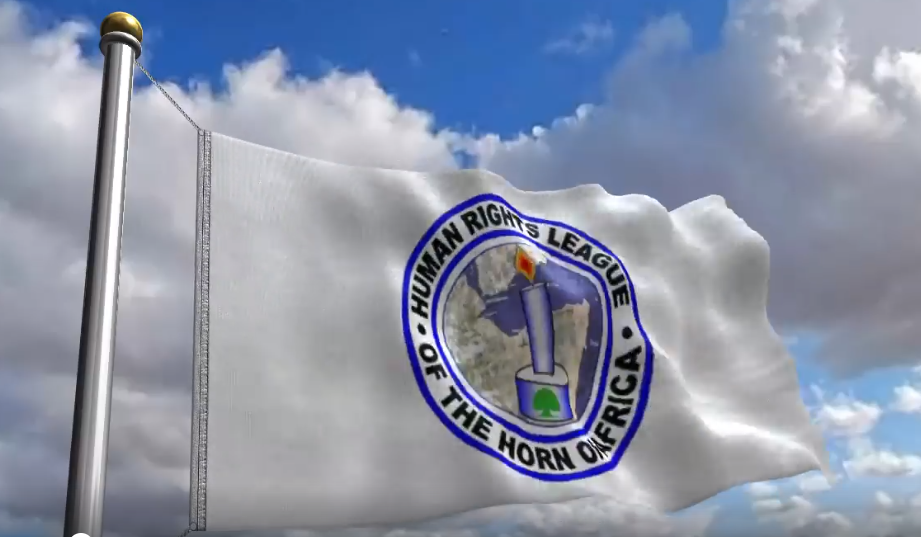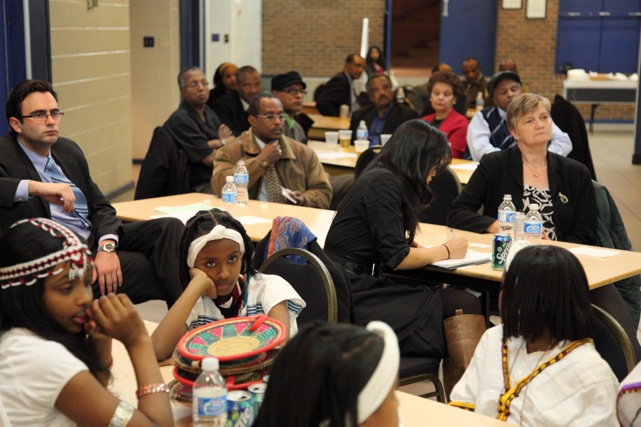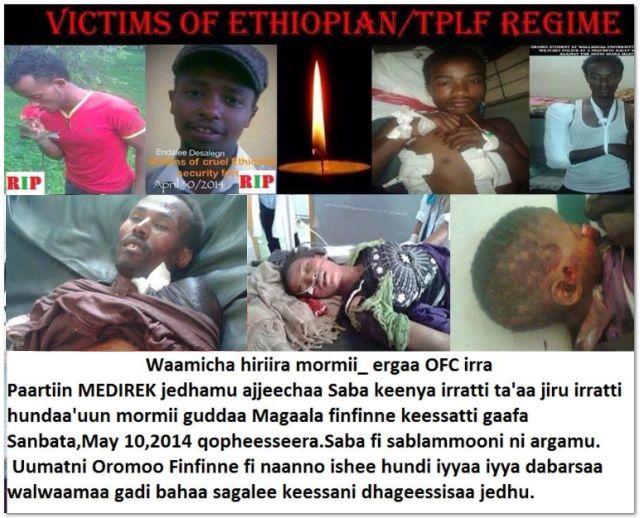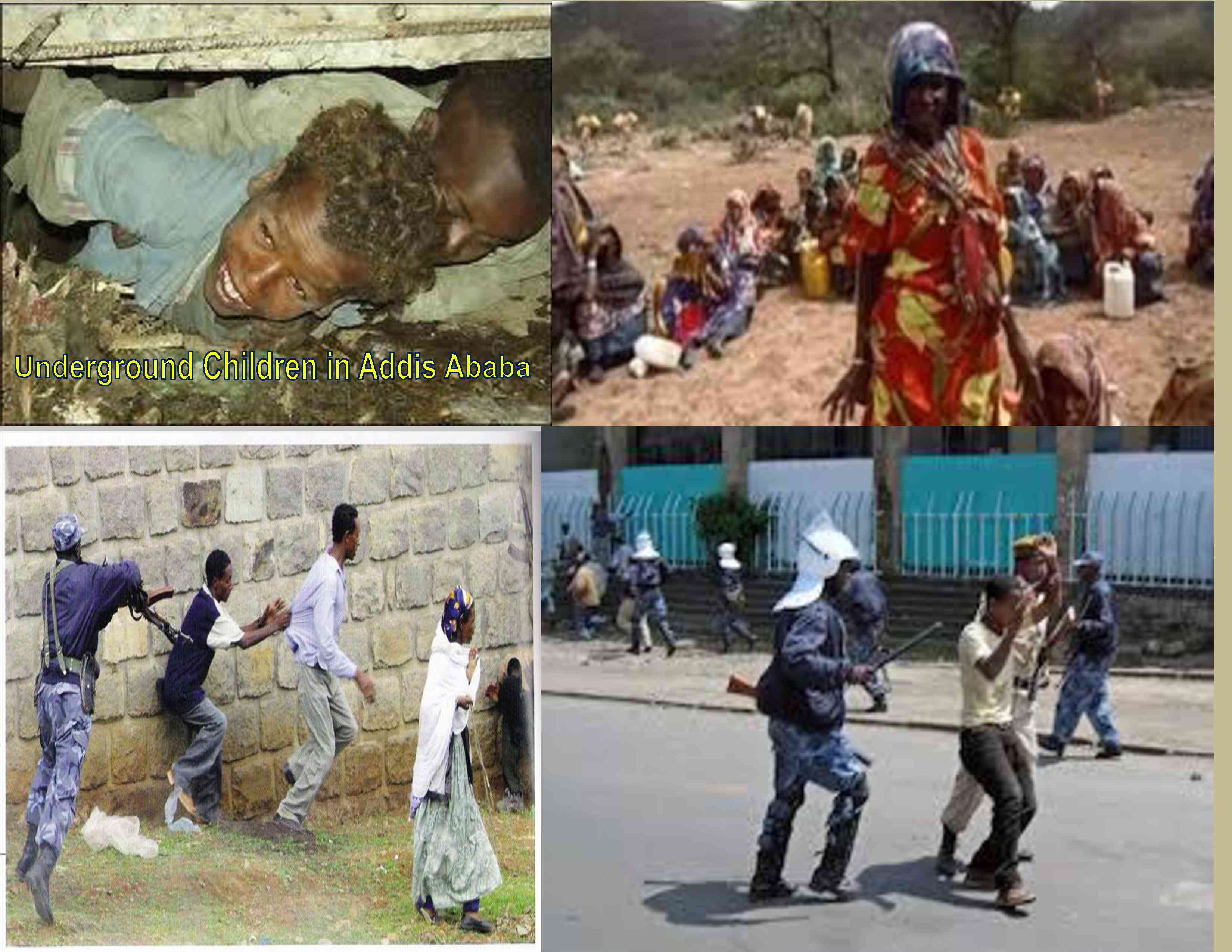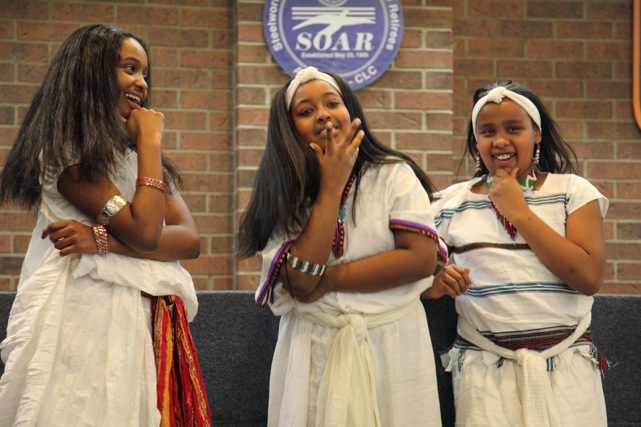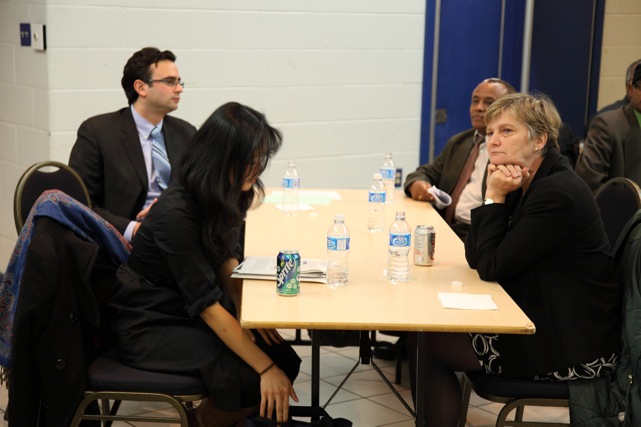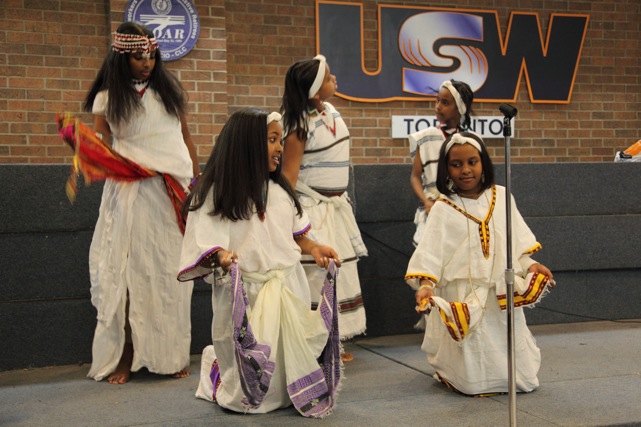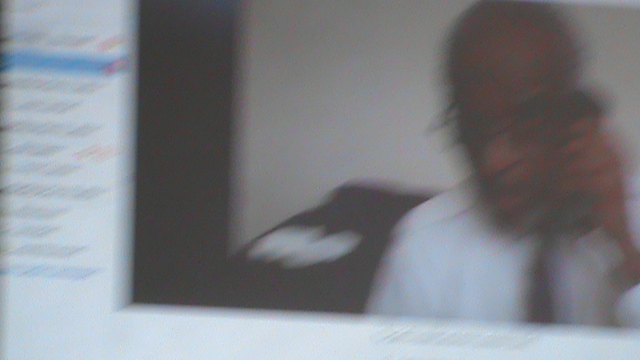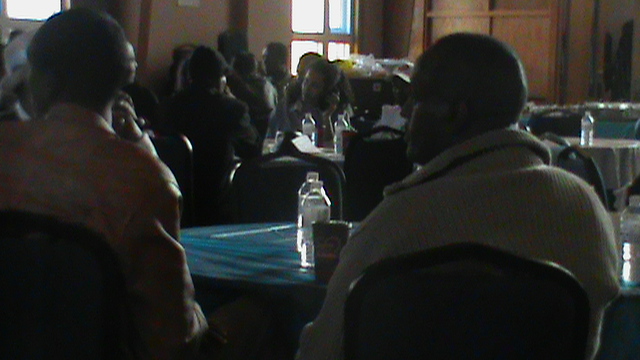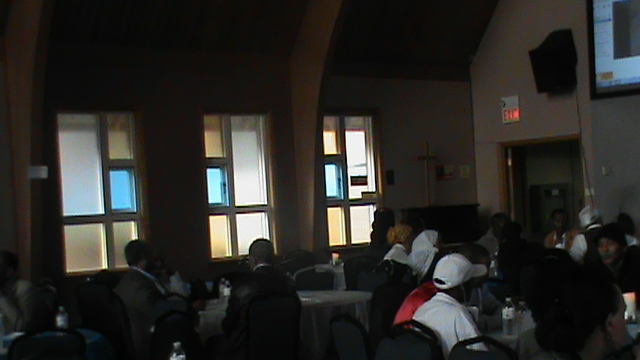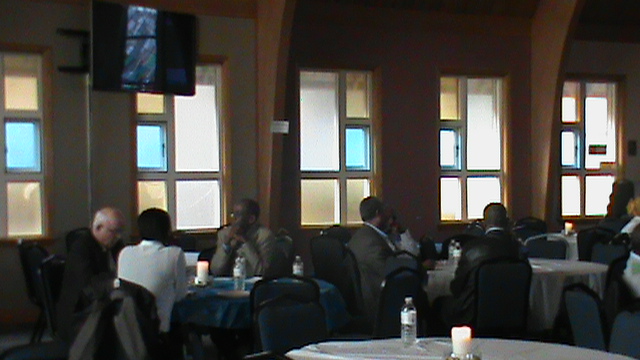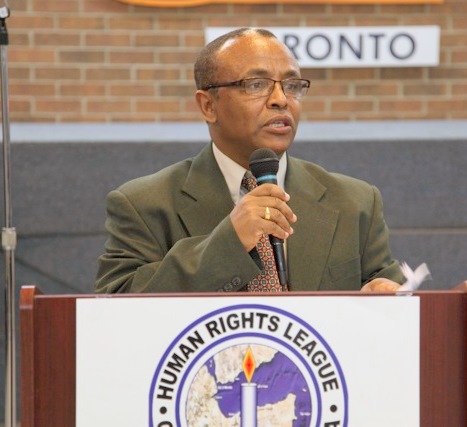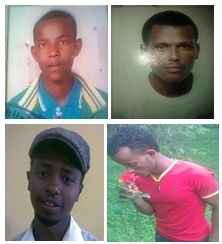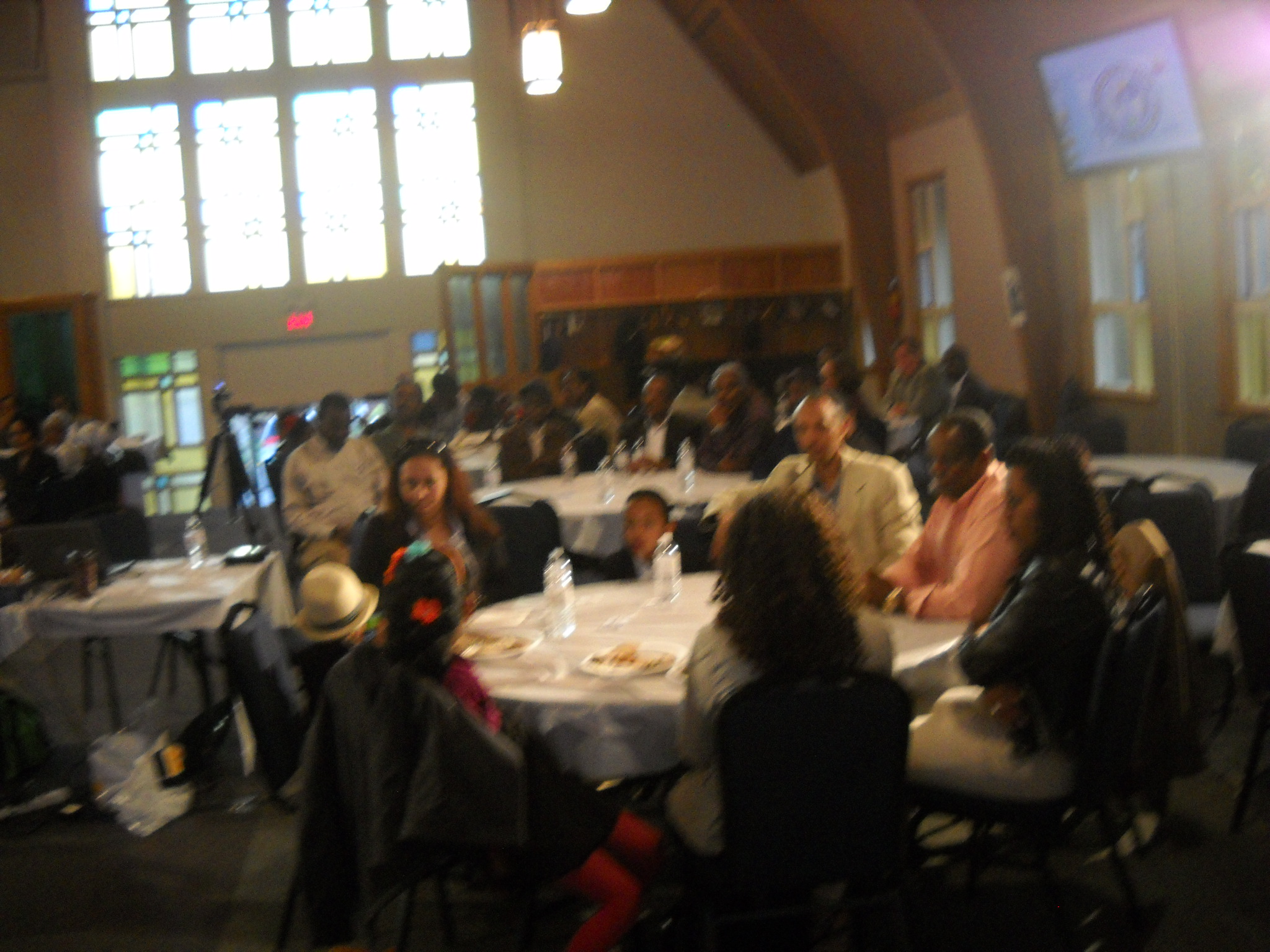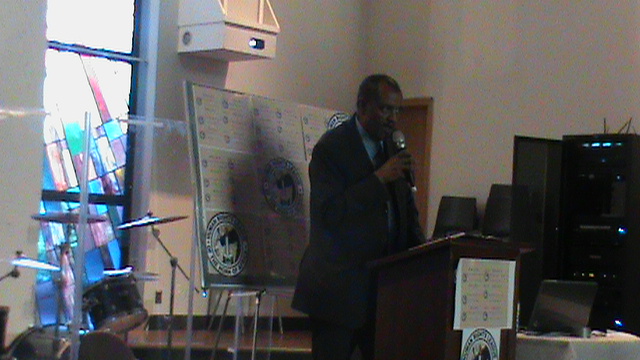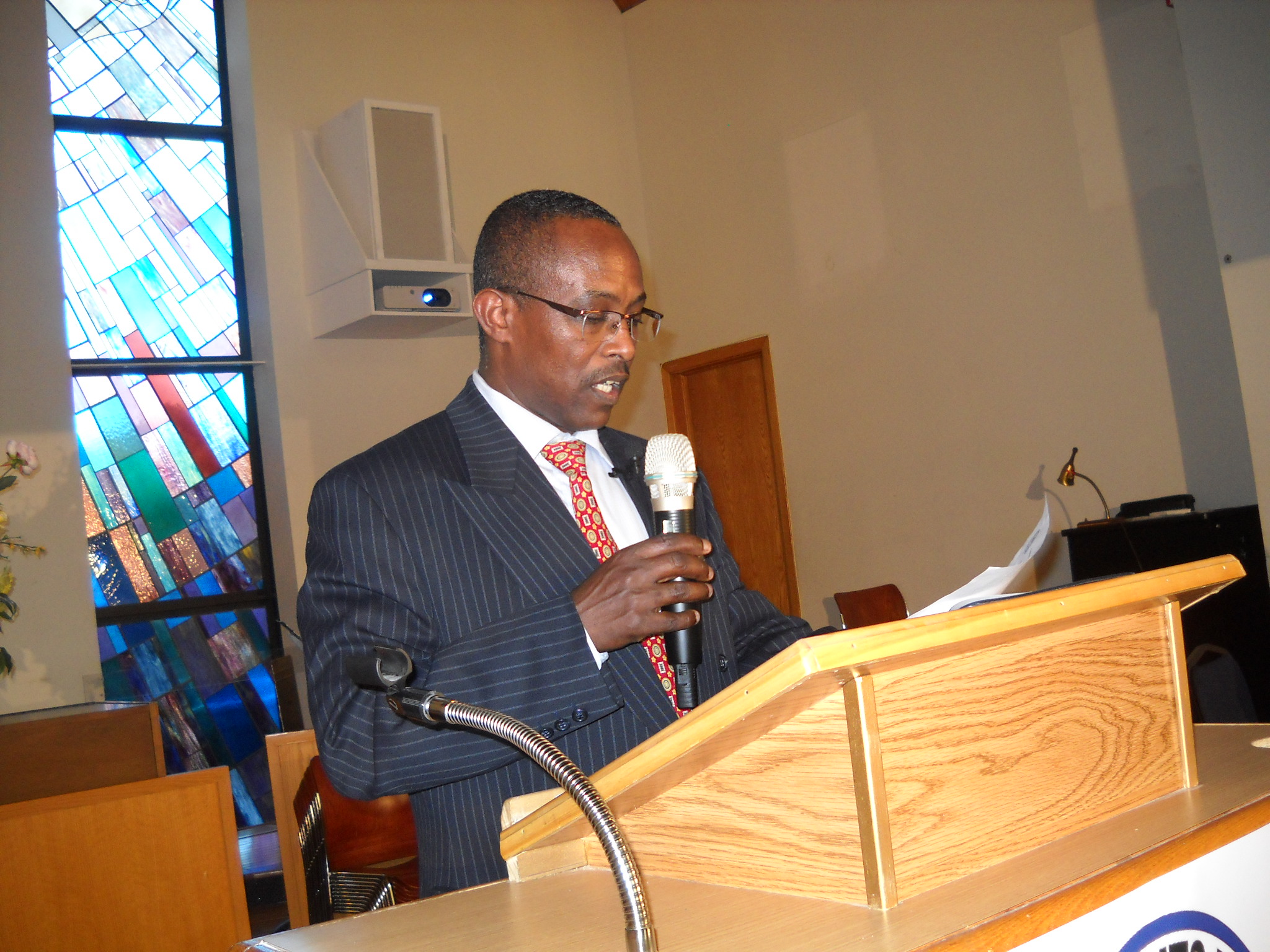Fifth Anniversary of HRLHA
A Speech at “Night to fight for human rights” Dinner and Entertainment Event
By Garoma B. Wakessa ;- Executive Director of HRLHA
May 5, 2012
Good evening and welcome to HRLHA’s “Night to fight for human rights” dinner and entertainment event. It is, as always, an honor to be a part of this event and especially this year, as we celebrate HRLHA’s fifth anniversary.
I have a number of people to thank tonight on behalf of myself and Human Rights League of the Horn of Africa.
First, I would like to take this opportunity to thank all who worked on Fundraising committee, and as Volunteers to put this event together,
Thanks to sisters who offered us a delicious dinner covering all expenses by themselves,
Thanks to HRLHA Board members for the service they are rendering to this organization.
Thanks to Mr. Garbi Nure and his band members for their incredible music service every year we organize fundraising,
I especially would like to take this opportunity to thank one of the HRLHA’s Board Members, Dr. Martha Kuwee Kumsa who went above and beyond to make this organization successful by supporting financially and from day one of its operation for five years,
And of course, my special thank you goes to Mr. Bayyisa Wakwaya who travelled so far from Europe/Geneva to Toronto to celebrate the fifth anniversary of the Human Rights League of the Horn of Africa with us.
And Finally, My very special thank you goes to everyone who is here tonight. Your attendance and participation in support of the Human rights League of the Horn of Africa is absolutely necessary to uphold our commitment of defending human rights.
Dear Friends,
It is my honor to celebrate the fifth anniversary of the Human Rights League of the Horn of Africa with such so many people in this beautiful hall.
Friends, first let me explain in short about HRLHA for those who are still not familiar with this Organization.
HRLHA was found in May 2007 in Toronto with the main objectives of monitoring human rights violations, conducting research and generate action to prevent and end grave abuses of human rights, and to demand justice for those whose rights have been violated in the Horn of Africa in general and in Ethiopia in Particular. Most of the founders of HRLHA are the exiled members of an agency called Human Rights League which was previously founded in Ethiopia in 1996 and silenced by the EPRDF Government in 1997. The Human Rights League of the Horn of Africa is structured in a way to cover the human rights violations in Ethiopia and neighboring states, because the human rights violation by Ethiopian government against its people was not limited only in the Ethiopian territory. Oromo and other asylum seekers who fled their country from fear of persecution are still not safe in neighboring countries from the long arm of Ethiopian dictatorial Government
Today, it is not exaggeration if we call the Horn of Africa is one of the most volatile areas in the world. For decades nearly all the states in the Horn of Africa have one or more crisis, political, socio-economic and cultural challenges, civil wars, violation of human rights, the suppression of civil liberties, famine, epidemics, population displacement, ecological disasters etc. are common phenomenon. These humanitarian Catastrophe and Social Collapse in the Horn are clearly indicating the lack of good governance in the Horn. The decision making and its implementation processes in the Horn are controlled by successors of warlords who came to power by force and who later changed their groups into political parties, transparency in a process making decisions and accountability in its implementation, people’s participation in the affairs of their countries, is denied in this type of system.
A Society subjugated under authoritarianism always demands justice, equality and freedom of life which will leads to the conflict between the society and the government. Any type of independent organizations (political, profession, and civil) are considered as an enemy of government. A person not supporting the government’s idea is suspected as member or as a supporter of these organizations and will be subjected to prison, torture, and other inhuman treatments. All resources in the country are directly or indirectly controlled by the dictator government. These are the reality in Ethiopia today.
Today, the family farming land which was used for centuries to produce different crops to meet their dietary needs has been taken from Oromo ,Gambella, and other farmers by the EPRDF/TPLF led Government of Ethiopia and leased to the foreign transnational companies and states to produce food for exports.
This massive land grabs targeting tens of millions of acres of the Oromia, Gambella, Ogaden, Afar, Benishangul-Gumuz and violate the rights of those people by depriving their rights of livelihoods, restricting their access to natural resources, and worsen poverty, hopelessness, insecurity and loss of their cultural identity. This uprooting of farmers from their ancestral land without consultation and compensation by force is nothing but, ethnic cleansing. By committing all such crimes against its people the Ethiopian Government failed to comply with obligations ” the state responsibility to protect its population from mass atrocity (genocide, war crimes, crime against humanity and ethnic cleansing) ”, the initiative established by the UN in 2005 to prevent and halt the mass atrocity. The Human Rights League of the Horn of Africa strongly condemns this reckless act of the Ethiopian Government repeatedly in its press releases and also presented its concern in person on UN 13th Session Human Rights Council in Geneva in March 1-26, 2010
Today, because of all these problems, hundreds of thousands Oromo nationals, Gambela and others are fleeing their country every day to the neighboring countries.
Ethiopia is among the world’s leading exporters of refugees, with some estimates putting the mass exodus at around 250,000 annually. The number of Ethiopians flees to neighboring countries significantly on increasing every year.
According to the report obtained from the officials of each country, in 2011 around150,000 Ethiopians fled to the following countries.
| # | 2011 Ethiopian Migrants | Destination |
| 1 | 52,000 | Yemen |
| 2 | 43,000 | Kenya |
| 3 | 30.00 | Djibouti |
| 4 | 15,000 | Israel |
| 5 | 10,000 | South Africa |
Human Rights abuse in stateless Somalia is rampant. Somalia a failed state with no effective central government since 1991 is the main source of instability in the Horn of Africa. Somalia’s problems range from civil war among warlords and clans which is a direct cause for massive humanitarian crises (such as famines, massive refugee flows to neighboring states and human rights abuses),
The intervention of the foreign forces such as Ethiopian force (2006-2009), Uganda, Kenya and Djibouti made the security problem and the humanitarian crisis in the country more complex.
According to the report of Refugee International an independent organization, today, roughly 500,000 people, almost all Somalis, live as refugees in Dadab, Kenya, 143,000 more Somali refugees live in the Dollo Ado camps in Ethiopia with more arriving daily. The Dadab refugee complex made up of three camps is considered as the third largest city in Kenya.
Sudan, the largest country in Africa, has not been stable for more than half a century. Sudan is considered as one of the countries where genocide has been taken place by the government sponsored killers. During the Sudan independence of 1956 from Anglo-Egyptian colony, the peoples in the south and western parts of the country were totally excluded from power sharing with the people in the north. Both the political and economic powers have been totally given to northern Arabs. As a result, the southern Afro-Sudanese people had no choice other than resisting the unfair power takeover by Northern Arabs ignoring the rest nations and nationalities in the territory. The rebel movement in South Sudan was created to regain the political power and economic resources unfairly monopolized by the northern Arabs by force.
The civil war in Sudan , which was the longest of its kind in Africa claimed more than 2Million life, came to an end in 2005 with the Comprehensive Peace Agreement (CPA) signed between the government of Sudan and the SPLM/A.On the other side the conflict in the west part of the Country, Darfur was already at its highest level. About half a million people were massacred in Darfur and more than 3 million others were displaced in the war between the joint force of the two Darfur rebel groups (Justice and Equality Movement /JEM and Sudan Liberation Army /SLA) and the government-backed Janjaweed Arab militia.
The Comprehensive Peace Agreement (CPA) has signed in 2005 between South and North Sudan has ended in July 9, 2011 with the declaration of the independence of South Sudan in which the South Sudanese people used their rights of self-Determination to determine their political future and freely to pursue their economic and cultural development. Sadly enough, after 9 Months the two countries are on the brink of returning to a new full scale of war.
HRLHA believes that the right to self—determination of peoples is a fundamental principle of human rights and International laws. The protection and promotion of the fundamental human rights principle is the corner stone in the establishment of free and prosperous society.
HRLHA has done its part in the past five years in advocating for the rights of self-determination as it is the universal and fundamental rights people and should be respected and promoted at all levels. HRLHA has attempted a lot to cover and bring to light the human rights violations in the Horn. More than Sixty (60) press releases, Forty (40) Urgent Actions were compiled and disseminated to individuals, different organizations, states and states agents Depending on the researches conducted by its staff members HRLHA sub-mitted its findings to the UN for review on Ethiopia civil and political rights, on torture or cruel, inhuman or degrading treatment or punishment.
HRLHA’s main achievements in five years includes, the release of detained asylum seekers and refugees from Sudan, Yemen and Somaliland, the delay and cancelation of the deportation of asylum seekers and refugees from Sudan, Yemen and Somaliland to Ethiopia under UN UPR(Universal Periodic Review) program .
Today, HRLHA is one of few Human Rights Organizations which received recognition for their credible information and quality jobs from the giant world organization, the United Nations. The Human Rights League of the Horn of Africa is granted a Special Consultative Status by the United Nations Economic and Social Council (ECOSOC), one of the six major organs of the UN, which enables HRLHA, among other things, to actively engage with the UN Economic and Social Council (ECOSOC) and its subsidiary bodies as well as with the United Nations Secretariat programs and agencies in a number of ways.
This is a great achievement for HRLHA staff members, Board Members, members, supporters and all human rights families which proved the effectiveness of our dedication in fighting for the respect of human rights and dignity. HRLHA believes that getting such a high level recognition from United Nations will encourage both its members and supporters to make more commitments in working towards the achievement of justice, peace, and stability for all human beings regardless of their political differences and geographic boundaries.
We should know that the privilege from UN came with enormous obligations which we must fulfill in order to exploit the privilege given to us.
In its operations of five years under very difficult situation, HRLHA has already shown that our ideas and plans have been translated in to practice and produced such excellent results. For those of us who are already paying sacrifice, let’s thank each other for coming to gather for such a common goal of life saving and renew our promise and commitment
I would like to remind our members the future plan of HRLHA is very wide and deep demanding more human and financial resources. It could be difficult to reach our goal with the scale of the resources we have been operating in the past five years. So, for the next fiscal year, we need more commitment and dedication from all members and supporters.
Therefore HRLHA calls upon its members, supporters, individuals, and donor organizations to join us to fight against the perpetrators of human rights in the Horn of Africa and to be a voice for the voiceless and help put an end to this tragic reality.
Thank you,
We Fight for Human Rights!!
====================================================================
A Speech at “Night to fight for human rights” Dinner and Entertainment Event
By Garoma Wakessa :- Executive Director of Human Rights League of the Horn of Africa/HRLH
A at the organisation’s 2nd annual Fundraising Dinner19 December 2009 Toronto/Canada.
- I would like to thank you all for attending this important dinner event of the Human Rights League of the Horn of Africa/HRLHA. It is great to see so many new faces this year, as well as those that are familiar.
- I would also like to thank all those who helped to organize this event,.
- Most importantly, I would like to thank our sister Organizations, Journalist for Human Rights, Amnesty International, Human Rights Watch and others for their strong support which ensure that HRLHA continues to go from strength to strength.
- I am happy to say we come together on the second anniversary of HRLHA’s founding, and it is wonderful to see how far we have come,
Friends, nothing is so important than rising our voice togetherTo defend the dignity of human being
- To challenge the successive rulers to stop gross human rights abuses,
- To stop all forms of intolerance and of discrimination based on ethnicity, religion or belief, gender, and etc..
- To defend freedom of association, and expression and
- for the voiceless citizens languishing behind the bar,
- for those who are on run and under hunting like wild animal because they left their country to save their life from persecutions.
- The prolonged human rights abuses in Horn of Africa in general is the cause for the urgent need of human rights organizations like HRLHA. The Horn of Africa, consisting of Djibouti, Sudan, Eritrea, Ethiopia and Somalia, is a region of considerable strategic importance, even to nations far beyond its borders because of its strategic location, its diverse religious and ethnic groupings and its significant agricultural potential
The political climate in the Horn of Africa today is influenced by local political and social conflicts not only in terms of specific histories and effects, but also their interaction with forces operating at a global level. The history of the countries of the Horn since the end of colonialism in the region has largely been one of violent repression and insurgency. Almost all governments in the region came to power by force or by stealing ballots.
Any form of Independent organisations labour associations, political organizations, human rights organizations, and others formed in civil society have proven to be ineffective. They have been either banned outright or forced to go underground.In spite of this, civil society can have an organization monitored by the government. The governments are often creating their own official organisations with a view to mobilising the population in public support of goals formulated by the regime themselves. The so-called GONGO (government organised non-governmental organisation) is a related phenomenon.
Groups may organise by affinity (for example age, kinship, gender, work and religion). The groups could include church groups, elder associations, youth groups and labour unions. On the other hand, they may gather only temporarily in public demonstrations or private meetings to pursue common ends. The level of independence or autonomy of civil society is often regarded as a significant indicator of the degree of democracy in a country.
The Horn of Africa countries are underdeveloped and the socio-economic systems are often rooted in exploitative relations.
The economic advantages of the ethnic in power over the rests escalate the differences among the whole society which usually result in conflicts.
In the past more than two decades hundreds of thousands of people have indeed become the victims of violent conflicts caused by dictatorships in the region..
Citizens of the Horn of Africa have faced a pervasive crisis for many decades. The people suffer from the impact of colonialism and authoritarianism, and the rule of those who try to manipulate and control the state for their own narrow interests.
Today the crisis in the Horn are
civil wars, violation of human rights, the suppression of civil liberties, abject poverty, famine, epidemics, population displacement, ecological disasters etc..
- Marginalized social groups – ethnic, women, children, the elderly, and the economically destitute and ethnic minorities The crisis in the Horn become more and more complicated and appears to be without end. The conflict between countries, the interest difference between different political groups within each country to control power and resources and the intense armed conflicts among different social groups.
- These conflicts result in further mismanagement of resources, violence, increase demographic displacement. Eventually, the crisis destroys healthy social relations by promoting militarization, tyranny and mutual animosity and together these over time produce a ‘culture of warfare’.
Countries in the Horn of Africa are governed by the successors of warlords who later changed their group into political groups/parties.
These ruling political groups often are not interested in power sharing, while formally presenting themselves as facades of representative democracy. These rulers have become clienteles and sectarian, leaving no political space for disenfranchised and marginalized social groups, who often have no choice but to resort to resistance to obtain freedom and emancipation. Consequently, the states themselves in the Horn of Africa have become central elements of the crisis, largely through their incessant quest to centralize and concentrate power. These states then produce and reproduce hegemonic facades, seemingly so inextricably caught up in their own political practices that they cannot extricate themselves from it. The only solution then is periodic disintegration of the states
Female refugees in particular are the major victims of such problems. In addition to what they share with other fellow refugees, they are exposed to gender, religious and cultural humiliations as well as rape. Actually, such socio-cultural, religious and gender problems were some of what forced them, in the first place, to flee their homelands. These and other similar issues are what necessitated the re-launching of HRL as HRLHA.
Human Rights League of the Horn of Africa (HRLHA) was formed in June 2007 in Toronto, Canada by exiled members of a human rights organization called Human Rights League (HRL), originally from Ethiopia.
HRLHA was established making its main purpose to challenge the governments of the Horn to stop the human rights abuses of all forms take place in those Horn countries.
Since HRLHA starts its operation the Human Rights situation in the Horn of Africa remained unimproved; and even got worse in some cases. HRLHA tried to expose those problems by deploying sufficient man power to monitor, investigate and report on human rights abuses that were committed in various forms.
HRLHA found the most big problem in the Horn of Africa is the human rights abuse committed to the asylum seekers by joint security forces from the residing country and the their countries of origion.
– Countries of the Horn including the Republic of Yemen have similar attitude towards asylum seekers coming from the neighbor countries in search of protection. In violation of Universal Declaration of Human Rights, articles 13 and 14, which guarantee the freedom of movement and the right to seek and to enjoy asylum in other countries, these countries fail to protect fundamental human rights of the asylum seekers in their territories. They instead intimidate asylum seekers by denying them even shelters and, in some cases, handing them over to the governments of their countries of origin. In those countries, human rights abuses against asylum seekers were committed by security agents of respective countries. HRLHA has reported such violations many times.
Human Rights are not just a means to an end; they are of fundamental importance in and of themselves. HRLHA believes that the protection of the fundamental human rights is a foundation stone in the establishment of free and prosperous society. Accordingly, we tried to accomplish the action plan set for the Organization at the beginning of its second fiscal year depending on its specific objectives. These included, and not limited to, cover and bring to light the human rights violations in the Horn of Africa.
With very limited human and financial resources, we published and disseminated significant number of press releases and Urgent actions on torturing, kidnapping, killings, and abductions committed against innocent civilians by the security forces in Ethiopia, Djibouti, Sudan, Somaliland and in the Republic of Yemen.
What HRLHA has witnessed in the last thirteen years is that fighting against human rights violations in countries like Ethiopia is not just a mere advocacy. It is a job of saving threatened and endangered lives of the innocent. Not only that the job is so big and demanding. The extreme suppression, denials of access to sources of information and of the right to exchange information, above all, the silencing of civil society organizations, human rights groups and press agencies in particular by the recently issued Civil Society law, make the activities of monitoring, detecting, investigating and reporting on human rights violations extremely difficult.
In spite of its multiple problems, HRLHA has done a remarkable job in the past two years. It has attempted a lot to cover and bring to light the human rights violations in the Horn of Africa with very limited human and financial resources obtained from its members.
I would like to bring to everyone’s attention that all those works were accomplished by volunteered HRLHA staff members in Diaspora and reporters back home as well as in neighbouring countries. HRLHA would like to express its deepest appreciations for their invaluable efforts; and say thank you on behalf of the targeted peoples.
Our Future Plan is very wide and we cannot by pass them. We have to fight for human rights. In order to effectively and adequately fight the ever worsening deepening human rights violations in Ethiopia and other Horn of African countries, HRLHA lied down unfolded plans
I would like to remind our members and supporters one more time that this job is too big and too heavy to be handled with a few hands. And we all understand that the peoples back home, on behalf of whom we are fighting, are in no position, particularly politically and economically, to do a lot. That is why HRLHA is turning its face towards those of us who are in Diaspora, who are free to act and react, and who are in a relatively better socio-economic and political situations to participate in saving threatened lives. This is the collective job to be executed collectively; but participations could be personal and in different ways. HRLHA is looking for support, financially or in kind, from organizations and individuals.
For those of us who are willing and ready to participate, let’s thank each other for joining hands for such a common goal of fighting for and defending human rights in order to save threatened human lives.
HRLHA has come a long way, but much remains to be done, and as the only organisation of its kind in this region, we are best placed to do it, we are the only ones placed to do it. Let us work together to make voice for those who are voiceless and lingushing in Horn of Africa prisons, for those deprived from their home countries and suffered in the hand of strange security force.
Thank you,
We Fight for Human Rights!!
